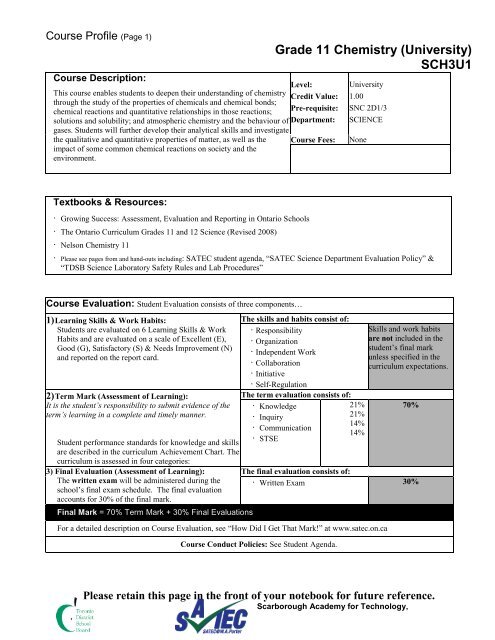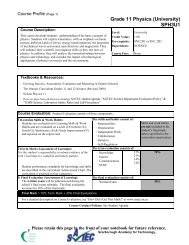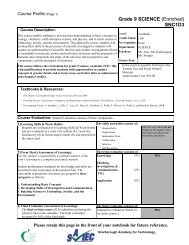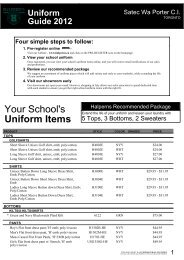Grade 11 Chemistry (University) SCH3U1
SCH3U1 - SATEC @ W.A. Porter C.I.
SCH3U1 - SATEC @ W.A. Porter C.I.
You also want an ePaper? Increase the reach of your titles
YUMPU automatically turns print PDFs into web optimized ePapers that Google loves.
Course Profile (Page 1)<br />
Course Description:<br />
This course enables students to deepen their understanding of chemistry<br />
through the study of the properties of chemicals and chemical bonds;<br />
chemical reactions and quantitative relationships in those reactions;<br />
solutions and solubility; and atmospheric chemistry and the behaviour of<br />
gases. Students will further develop their analytical skills and investigate<br />
the qualitative and quantitative properties of matter, as well as the<br />
impact of some common chemical reactions on society and the<br />
environment.<br />
<strong>Grade</strong> <strong>11</strong> <strong>Chemistry</strong> (<strong>University</strong>)<br />
<strong>SCH3U1</strong><br />
Level:<br />
Credit Value:<br />
Pre-requisite:<br />
Department:<br />
Course Fees:<br />
<strong>University</strong><br />
1.00<br />
SNC 2D1/3<br />
SCIENCE<br />
None<br />
Textbooks & Resources:<br />
· Growing Success: Assessment, Evaluation and Reporting in Ontario Schools<br />
· The Ontario Curriculum <strong>Grade</strong>s <strong>11</strong> and 12 Science (Revised 2008)<br />
· Nelson <strong>Chemistry</strong> <strong>11</strong><br />
· Please see pages from and hand-outs including: SATEC student agenda, “SATEC Science Department Evaluation Policy” &<br />
“TDSB Science Laboratory Safety Rules and Lab Procedures”<br />
Course Evaluation: Student Evaluation consists of three components…<br />
1) Learning Skills & Work Habits:<br />
Students are evaluated on 6 Learning Skills & Work<br />
Habits and are evaluated on a scale of Excellent (E),<br />
Good (G), Satisfactory (S) & Needs Improvement (N)<br />
and reported on the report card.<br />
2) Term Mark (Assessment of Learning):<br />
It is the student’s responsibility to submit evidence of the<br />
term’s learning in a complete and timely manner.<br />
Student performance standards for knowledge and skills<br />
are described in the curriculum Achievement Chart. The<br />
curriculum is assessed in four categories:<br />
3) Final Evaluation (Assessment of Learning):<br />
The written exam will be administered during the<br />
school’s final exam schedule. The final evaluation<br />
accounts for 30% of the final mark.<br />
Final Mark = 70% Term Mark + 30% Final Evaluations<br />
The skills and habits consist of:<br />
· Responsibility<br />
· Organization<br />
· Independent Work<br />
· Collaboration<br />
· Initiative<br />
· Self-Regulation<br />
The term evaluation consists of:<br />
· Knowledge<br />
· Inquiry<br />
· Communication<br />
· STSE<br />
21%<br />
21%<br />
14%<br />
14%<br />
Skills and work habits<br />
are not included in the<br />
student’s final mark<br />
unless specified in the<br />
curriculum expectations.<br />
70%<br />
The final evaluation consists of:<br />
· Written Exam 30%<br />
For a detailed description on Course Evaluation, see “How Did I Get That Mark!” at www.satec.on.ca<br />
Course Conduct Policies: See Student Agenda.<br />
Please retain this page in the front of your notebook for future reference.<br />
Scarborough Academy for Technology,
Course Profile (Page 2)<br />
<strong>Grade</strong> <strong>11</strong> <strong>Chemistry</strong> (<strong>University</strong>)<br />
<strong>SCH3U1</strong><br />
Course Outline:<br />
Unit<br />
Matter,<br />
Chemical<br />
Trends, and<br />
Chemical<br />
Bonding<br />
Chemical<br />
Reactions<br />
Quantities in<br />
Chemical<br />
Reactions<br />
Solutions &<br />
Solubility<br />
Gases &<br />
Atmospheric<br />
<strong>Chemistry</strong><br />
Skills &<br />
Careers<br />
Description<br />
Different elements and compounds have different properties and can be represent visually<br />
in a variety of ways. Elements combine to form chemical bonds and are organized in the<br />
periodic table in predictable trends. The different properties of chemicals change their<br />
effects on human health and environment and augmenting these properties may reduce<br />
their impact.<br />
Chemical reactions are used in a variety of applications and have impacts on society and<br />
the environment. Students will investigate and differentiated between several different<br />
types of reactions.<br />
Approximat Major Unit<br />
e Length Evaluation<br />
4 weeks Environmental<br />
Effects of Hazardous<br />
Substances<br />
4 weeks<br />
Students will investigate quantitative relationships in chemical reactions, learn to solve 3 weeks<br />
related problems and connect the concept of the mole to these quantitative relationships.<br />
This knowledge will be related to chemical quantities and calculations used at home, and in<br />
environmental and industrial workplaces.<br />
Students will learn about the qualitative and quantitative properties of solutions and learn<br />
to solve related problems. This knowledge will be related to the analysis of water and the<br />
variety of social an environmental issues associated with drinking water.<br />
3 weeks<br />
Green Product<br />
Students will learn about the laws that explain the behaviour of gases and solve related<br />
problems. By understanding gases, the cumulative effects of human activities and<br />
technologies on air quality can be investigated. Canadian initiatives to reduce air pollution<br />
will also be studied.<br />
3 weeks Effect of pollution on<br />
the atmosphere<br />
Scientific investigation skills and career exploration.<br />
Integrated into<br />
each unit.<br />
Note: At least 2 of the above 3 projects will be assigned.<br />
All of the above units will also include tests, quizzes, labs, and assignments.<br />
Note: Order that the units are delivered may change due to student needs and resources available during the course.<br />
General Information:<br />
1 – As per SATEC school policy students are expected to come to class:<br />
a) in uniform and,<br />
b) with cell phones, mp3 players etc… unseen and not in use<br />
during class time.<br />
2- To be successful in Science, students are expected to:<br />
a) come to class prepared with pen/pencil, paper binder and<br />
resources for your particular Science course,<br />
b) demonstrate academic honesty with their own work and when<br />
working with others,<br />
c) complete assignments in a timely manner and,<br />
d) follow necessary safety rules and procedures of a Science Lab.<br />
Note: For clarification of any of the above issues please see the<br />
SATEC agenda along with our own SATEC Science Department<br />
Evaluation Policy and/or the TDSB defined Science Laboratory<br />
Safety Rules and Lab Procedures presented the first week of<br />
class and stored at the front of your notebooks for future<br />
reference.<br />
3- To seek extra help:<br />
a) speak to your Science Teacher and schedule a time to meet,<br />
b) use the school’s homework club to access peer tutors and/or,<br />
Science Department deadlines and plagiarism policy.<br />
Each assignment will have a due date. Handing in an assignment after<br />
the due date may result in a deduction of marks at the discretion of<br />
the teacher.<br />
Students must be in class on dates of any major assessments. IF you<br />
miss a major assessment (i.e. unit test, exam, presentation) you must<br />
give your teacher a note written and signed by your doctor or parent<br />
stating the health reasons that kept you from class. Without a doctor’s<br />
note, you will receive a mark of zero for that missed major assessment.<br />
-If you know ahead of time that you will have an appointment, field<br />
trip, game, etc at the same time as the major assessment, you must<br />
either arrange with your teacher to complete the assessment before the<br />
scheduled date, or cancel your other plans so you can attend the<br />
evaluation.<br />
Plagiarism includes: copying another student’s work, buying essays,<br />
copy/paste web info and call it your own work, using information from<br />
print or internet media without identifying the source. To avoid<br />
plagiarism:<br />
Do not cheat; Do not copy. Keep your eyes on your own paper during<br />
tests and exams. Do not steal intellectual property. Reference<br />
information properly (MLA)<br />
We only need to suspect cheating to penalize you.<br />
There will be no warnings, only marks of zero.<br />
c) speak to your guidance councillor to arrange for a tutor.<br />
This course meets Environment and ICT SHSM program requirements.<br />
Please retain this page in the front of your notebook for future reference.
Course Profile (Page 3)<br />
<strong>Grade</strong> <strong>11</strong> <strong>Chemistry</strong><br />
<strong>SCH3U1</strong>







